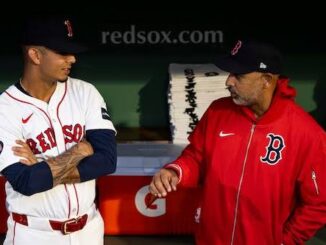With his whirling, twisting delivery — strikingly unique from any other pitcher in history — Luis Tiant turned his performances into theater. During the peak of his career in the 1970s, you didn’t need a radio or television to know that Tiant was pitching at Fenway Park.
Throughout the packed houses he pitched in front of, cries of “Looie, Looie, Looie!” echoed around Kenmore Square and other parts of Boston’s Back Bay neighborhood.
The lovably charismatic El Tiante — as he came to be known throughout his memorable career — died on Tuesday at the age of 83.
But he left behind a legacy that won’t be forgotten by those who knew him, played with him or cheered for him.
“At least people still remember me and remember what I did all those years,” Tiant said in a 2017 interview with MLB.com. “I know what I’ve had to do with my life, and I’m lucky. I’m lucky I played all those years. God gave me the opportunity to play. What more can you ask? You can’t ask for more than that.”
His teammates never asked for more than what Tiant gave them.
“Nobody was a tougher competitor — or a better teammate. He meant too much to us, and to the fans. We all loved him,” wrote Hall of Famer Carl Yastrzemski in the foreword of Tiant’s autobiography, “Son of Havana,” which was published in 2019.
We send our deepest condolences to the family, friends and fans of three-time All-Star Luis Tiant, who has passed away at 83.
Luis started three games for the @RedSox in the ‘75 World Series, with two complete games and 25.0 innings pitched. He accompanied @MLB on the 2016… pic.twitter.com/GHkwzwJvQI
— MLB Communications (@MLB_PR) October 8, 2024
In a 19-year Major League career, the Cuban native had a career record of 229-172 with a 3.30 ERA, pitching for Cleveland (1964-69), Minnesota (’70), Boston (’71-78), the Yankees (’79-80), Pittsburgh (’81) and the Angels (’82).
When fellow Cuban Tony Oliva was inducted into the Hall of Fame in 2022, he stood on the stage on a stifling hot Sunday in Cooperstown, N.Y., and noted that Tiant deserved to be there also.
Though Tiant never got the call from the Hall, the three-time All-Star led the American League in Baseball Reference WAR for pitchers in 1968 and was in the top 10 in seven other seasons. That ’68 season was the Year of the Pitcher and Tiant played the part better than anyone not named Bob Gibson or Denny McLain, posting a 1.60 ERA in the first of his eventual four 20-win seasons.
The 1975 World Series, in which the upstart Red Sox played a compelling seven-game set before ultimately falling to Cincinnati’s vaunted Big Red Machine, turned Tiant into a household name.
But for the gritty righty, the son of a Negro Leagues star (Luis Tiant Sr.), it all started in Cuba, where he was born on Nov. 23, 1940. Tiant followed in his father’s footsteps, becoming an ace in his homeland during his youth.
The problem was that Cuba didn’t have professional baseball once Fidel Castro took power in 1959.
For three seasons — from 1959 through ’61 — Tiant pitched for the Mexico City Tigers, hoping he would be noticed by a pro scout.
Tiant got his wish when Cleveland purchased his contract from Mexico City for $35,000 prior to the ’62 season. Any remorse Tiant might have had for fleeing to the United States straight from Mexico City was eliminated by a letter his father had written him a couple of months earlier that was quoted in Tiant’s autobiography:
“Don’t come home. Castro is not going to allow any more professional sports here — no baseball or boxing. If you do come home, I don’t think you’ll be able to get out again. They are not letting many people leave the island, especially young men of military age.”
Years after his father, a lefty, had dominated in the Negro Leagues, Luis Jr. carved his own path in the United States, starting with parts of three seasons in the Minors.
In 1964, Tiant got his break when Cleveland needed a starter for a July 19 game at Yankee Stadium against a team that was in the middle of a dynasty. All Tiant did in his debut was fire a four-hit shutout with 11 strikeouts while outdueling the legendary Whitey Ford.
“I was not nervous, but had a little tension,” Tiant said in a 2009 documentary about his life, “Lost Son of Havana.” “You’re pitching against best team in baseball, you’re a rookie. That day was my day. They let me do what my father couldn’t do.”
When Tiant started the ’68 All-Star Game, many Cubans — including his father — watched him on television as a Major Leaguer for the first time.
However, by ’69, Tiant started to have arm problems and his ERA swelled to 3.71. In ’70, he started 6-0 for the Twins, but disaster soon struck. Tiant felt a popping sensation on a breaking ball during a start and learned that he had a broken scapula.
Medical science not being what it would evolve into, doctors suggested to Tiant he would never pitch again.
Cut by the Twins the day before camp broke in ’71, Tiant was signed to the Braves’ Minor League system, but he was released after a month. The Red Sox signed him two days later, and it wound up being one of the best moves in club history. Still building his arm strength back up after the Red Sox recalled him from the Minors, Tiant went 1-7 with a 4.85 ERA in 21 appearances.
There weren’t many expectations for Tiant entering ’72, but that was the season he reinvented himself. Lacking the dazzling fastball he once had, Tiant recreated his delivery into one that nobody had ever seen before.
Perhaps Joe Garagiola described it best to the NBC audience years later.
“If you’re sitting in center field, you got to see his eyeballs. Look at that,” Garagiola said.
There was a method to Tiant’s madness, which he explained in the documentary.
“I knew I needed something different,” he said. “I had to do something so I could hide the ball better to keep me back more. It gave me more power. I changed my delivery completely.”
For the Red Sox, Tiant turned into an utter force, winning 81 games in a four-season span (1973-76).
In ’75, it all came together for Tiant, on and off the field. With relations between the United States and Cuba softening a little that year, United States Senator Edward Brooke from Massachusetts wrote a letter to Castro asking for Tiant’s parents to be permitted to fly from Cuba to Boston to see their son for the first time in 14 years.
Senator George McGovern, who had already scheduled a trip to Cuba to discuss other business, hand-delivered the letter to Castro, who granted the request. In fact, Castro said that Tiant’s parents could remain in the United States for as long as they wished.
Luis Sr. and Isabel Rovina Vega Tiant arrived in Boston in August 1975. Luis Jr., by then a husband and a father, wept with joy when his parents walked off the plane.
One of the most emotional moments took place on Aug. 26 of that ’75 season, when the Red Sox invited the elder Tiant to throw out the ceremonial first pitch on a night his son was starting against the Angels. While Luis Sr. fired a strike, his son held his dad’s sport coat from just behind the mound and beamed with pride.



Be the first to comment